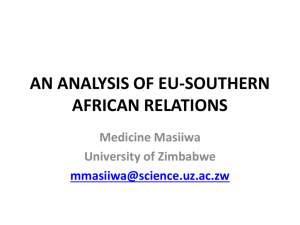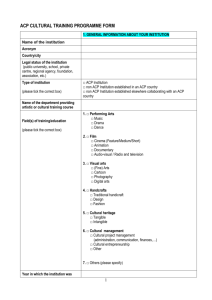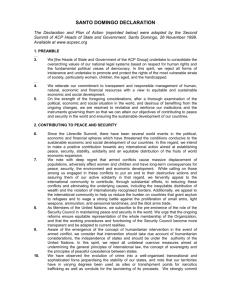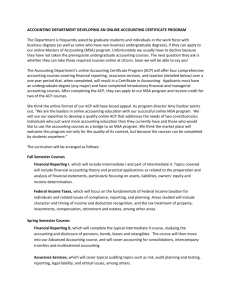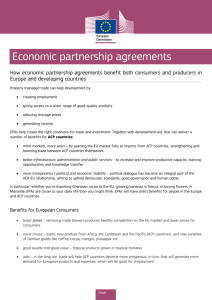EN Council Conclusions on the economic partnership agreement
advertisement
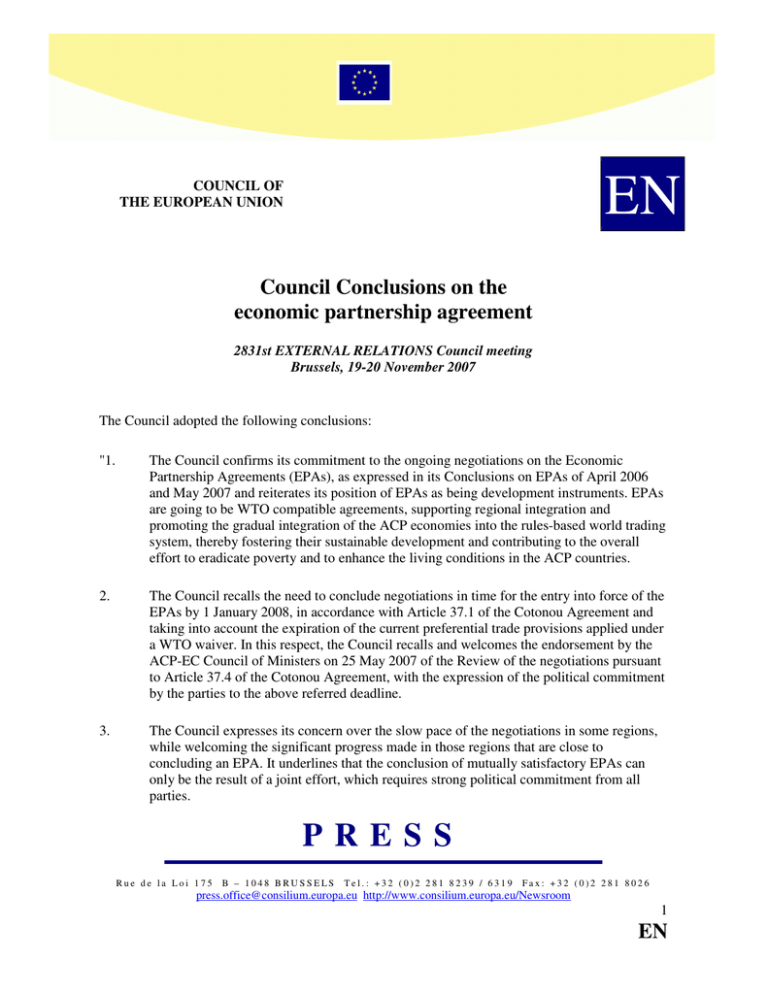
EN COUNCIL OF THE EUROPEAN UNION Council Conclusions on the economic partnership agreement 2831st EXTERNAL RELATIONS Council meeting Brussels, 19-20 November 2007 The Council adopted the following conclusions: "1. The Council confirms its commitment to the ongoing negotiations on the Economic Partnership Agreements (EPAs), as expressed in its Conclusions on EPAs of April 2006 and May 2007 and reiterates its position of EPAs as being development instruments. EPAs are going to be WTO compatible agreements, supporting regional integration and promoting the gradual integration of the ACP economies into the rules-based world trading system, thereby fostering their sustainable development and contributing to the overall effort to eradicate poverty and to enhance the living conditions in the ACP countries. 2. The Council recalls the need to conclude negotiations in time for the entry into force of the EPAs by 1 January 2008, in accordance with Article 37.1 of the Cotonou Agreement and taking into account the expiration of the current preferential trade provisions applied under a WTO waiver. In this respect, the Council recalls and welcomes the endorsement by the ACP-EC Council of Ministers on 25 May 2007 of the Review of the negotiations pursuant to Article 37.4 of the Cotonou Agreement, with the expression of the political commitment by the parties to the above referred deadline. 3. The Council expresses its concern over the slow pace of the negotiations in some regions, while welcoming the significant progress made in those regions that are close to concluding an EPA. It underlines that the conclusion of mutually satisfactory EPAs can only be the result of a joint effort, which requires strong political commitment from all parties. PRESS Rue de la Loi 175 B – 1048 BRU SSELS Tel.: +32 (0)2 281 8239 / 6319 Fax: +32 (0)2 281 8026 press.office@consilium.europa.eu http://www.consilium.europa.eu/Newsroom 1 EN 4. The Council considers that the Commission Communication on the Economic Partnership Agreements provides a useful assessment of progress and challenges at a crucial stage of the negotiations, and is a pragmatic indication of the best way forward with respect to WTO requirements. The Council endorses the two-step approach proposed in the Communication to negotiate WTO compatible agreements including market access for goods as an interim solution for ACP regions or sub-regions. In this regard, recalling that EPAs aim at establishing WTO compatible agreements between the parties on the basis of the development objectives of the Cotonou Agreement, the Council will examine, in view to its adoption, the draft Regulation proposed by the Commission aiming at applying as of 1 January 2008 as a first step the arrangements for goods originating in certain states which are part of the Africa, Caribbean and Pacific Group of States (ACP) provided in agreements establishing, or leading to the establishment of, Economic Partnership Agreements. 5. The Council maintains that, in order to maximise the development potential of the EPAs, all WTO compatible flexibility must be allowed for the ACP liberalisation processes. In this context, it emphasises that any EPA should allow asymmetry between ACP and EU market access commitments, including in the provision of appropriately long transition periods, and in very exceptional cases even longer periods, which take account of the development needs of the ACP countries. The Council further recognises the need for improved Rules of Origin in EPAs, making them simpler, more transparent, easier, improved and predictable in order to ensure that ACP States can fully benefit from preferential market access, whilst preventing circumvention. 6. The Council respects the right of all ACP States and regions to determine the best policies for their development and it acknowledges that the ambition for the scope of an EPA may differ from one region to the other. At the same time the Council, in conformity with its Conclusions of May 2007, considers that the EPAs should include trade in services, investment and other trade related areas. It believes that such agreements fulfil the objectives of economic and trade cooperation as set out in the Cotonou Agreement and contribute to release the full development benefits of EPAs. The Council supports a flexible and phased approach in trade-related areas. 7. The Council further recalls that, in light of Cotonou obligations, new trading arrangements should be established by 1 January 2008, in order to improve the situation for ACP countries and to avoid negative effects on the trade flows between them and the EU. Hence, while it appeals on all parties to advance as much as possible in all aspects of the EPA, the Council urges them to focus their negotiating efforts especially on the segment of trade in goods. The Council considers that an interim agreement covering WTO compatible trade in goods agreements and other aspects that have already been agreed at this stage should be considered as a first step in a process that should lead to a full EPA. In this respect, it underlines its position that all parties should agree to pursue negotiations within agreed timeframes in outstanding areas if agreement on these issues cannot be reached before the end of 2007. The Commission should inform the Council on regular basis on the progress achieved on these issues. 2 EN 8. The Council acknowledges the specific interests of the outermost regions. It assures that these interests will be taken into account in the final stage of the EPA negotiations. 9. One of the main objectives of the EPAs is to support and foster regionally owned integration processes. The Council acknowledges that the level of existing regional integration varies within the six ACP regions and that in some regions not all countries are yet in a position to enter into an EPA in the agreed timeframe. At the same time, the Council firmly holds that EPAs, as development and regionally inclusive instruments, can serve the interest of all ACP States more than any other WTO compatible option currently accessible. In this context, in those cases where the only possible option to conclude an agreement within the mandatory deadline is to sign at sub-regional level in order to avoid negative impacts on any ACP country, the Council emphasises that such agreements should include accession clauses that ensure the full possibility to join in for all countries of the region willing to participate at a later stage. These agreements should be consistent with regional economic and political integration processes. 10. The Council stresses the importance of remaining engaged in helping the ACP adjust to the changes linked to EPAs and enhance regional integration to seize the new trade opportunities they bring. The Council is therefore determined to ensure optimal interaction and coherence between EPAs and development cooperation. The Council notes that it has been agreed with all regions that development cooperation provisions should be included in the EPAs and that the programming of the 10th European Development Fund (EDF) offers a unique opportunity to synchronise trade policy decisions taken in the EPAs and programming of EDF resources. The Council recommends that priority is given to finalise with the ACP countries and regions the identification of key accompanying measures and programmes, using, to the maximum extent possible, the outcome of the work of the Regional Preparatory Task Forces. Of particular concern will be that each ACP region is given adequate support, based on needs prioritised by the region. For those regions concluding interim agreements, the Council recognizes that development finance will be needed already at this stage to accompany adjustment linked to liberalisation and as a complementary instrument amplifying the development dimension of the agreements. 11. The Council recalls the adoption in October 2007 of the EU strategy on Aid for Trade. The strategy made a commitment that, in the context of efforts to increase the collective EU trade related assistance to € 2 billion annually by 2010, in the range of 50% of the increase will be available for the needs prioritised by the ACP countries. The provision of increased, high quality Aid for Trade (AfT) had been promised by the EU in order to support ACP regions, countries and local communities, including small producers, to take full advantage of increased trade opportunities and maximise the benefits of trade reforms, including those of the EPAs, while the collective EU delivery of AfT does not depend on the outcome of the negotiations. The Council underlines that all ACP regions should receive a fair share of this overall amount. 12. The Council urges all parties to redouble their efforts in order to reach agreement on these negotiations in this last crucial period. In this context, it underlines the need to agree, before the end of the year, WTO compatible solutions, in accordance with the Cotonou Agreement, that provide to non-LDC ACP countries improved access into the EU market and guard against trade disruption. To that end, the General Affairs and External Relations Council will revert to this issue in December 2007, on the basis of a report and recommendations from the Commission. 3 EN 13. The Council underlines that suitable review clauses, as well as clauses that establish appropriate mechanisms for monitoring and review implementation as well as development impacts, with special attention to the most vulnerable ACP countries and communities, will be a key part of the EPA’s texts. In order to uphold the development dimension of the EPAs, the monitoring system should be based on objective and transparent criteria agreed through a broad and inclusive participatory approach, including Parliaments and non-State actors from both ACP states and the EU. Overseeing and monitoring should be a integral function of the EPA institutions. 14. The signature of the EPAs will be the beginning of a process, with a view to reinforcing regional integration and promoting the advancement of the ACP economies. The Council will continue to follow this matter in order to ensure that EPAs effectively contribute to improve prospects for development in the ACP countries". ____________________ 4 EN


